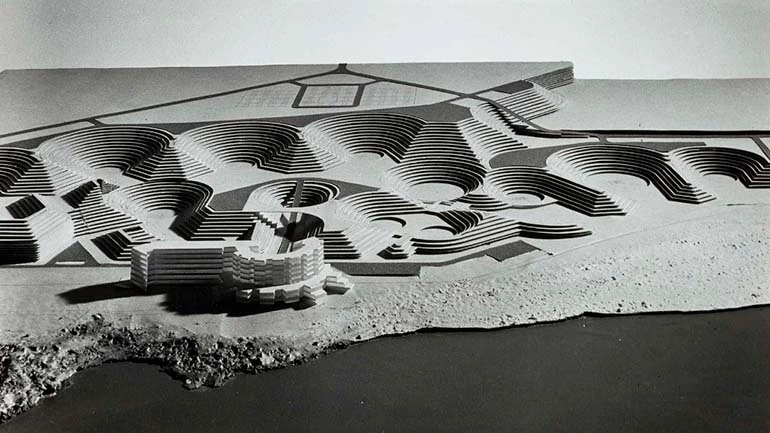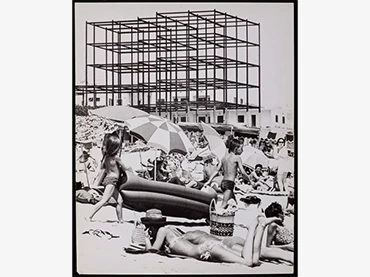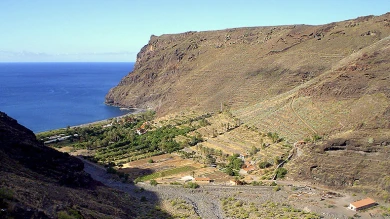
Held on 27 Jun 2022
This day of lectures and encounters, the fourth instalment of the series organised by the inter-university group TURICOM — which is part of the project Paradoxical Modernity: Artistic and Tourist Experience in Developmentalist Spain (1959–1975), PGC2018-093422-B-I00 (MCI/AEI/FEDER, UE) — endeavours to examine the relationship between tourist imaginaries and the visual arts from the 1960s onwards. By virtue of a selection of brief lectures and a final conversation, followed by a debate, it looks to reflect on mass tourism and the way in which, as the industry of experience, it is connected to the search for a lived experience that has shaped contemporary art.
In this latest edition, the idea of the tourist city as a utopia/dystopia is explored in relation to the concept of “architecture of pleasure” developed by Henri Lefebvre in his book Toward an Architecture of Enjoyment. In 1973, the French philosopher and urban planner was inspired by the work Mario Gaviria, his pupil, carried out in Benidorm. The initial title was also Gaviria’s suggestion, stemming from his view of Benidorm as a model for the future. Yet Lefebvre preferred not to speak of “pleasure” as such but jouissance, a hard-to-translate term that denotes enjoyment both beyond pleasure and also against it.
What desires did tourist cities have to arouse in their permanent or temporary residents? What were the architecture of pleasure promises and what pain did they open the way for? What dystopias have we inherited from the tourist utopias of the 1960s? These are the questions that anchor the session.
[dropdown]
Eugenia Afinoguénova is a professor of Spanish Literature and Cultural History at Marquette University in Milwaukee (USA). Her most recent publication is El Prado: la cultura y el ocio (1819-1939) (Cátedra, 2019), and she has also co-edited a number of anthologies, including Spain Is (Still) Different: Tourism and Discourse in Spanish Identity (Lexington Books, 2008, with Jaume Martí-Olivella) and the forthcoming The Edinburgh Companion to the Spanish Civil War and Visual Culture (Edinburgh University Press, 2023, with Silvina Schammah Gesser and Robert Lubar Messeri). Moreover, she has contributed to multiple anthologies focused on themes around the tourism imaginary, film and, more recently, environmental studies.
Cristina Arribas is an architect and urban planner in Badalona City Council and a professor in the Department of Theory and History at the Escola Tècnica Superior d’Arquitectura de Barcelona (ETSAB). Her most recent publications most notably include “El nuevo paisaje turístico español a través de las tarjetas postales de los años 60” in Sobre, No. 5 (2018) and “La puesta en escena del paisaje turístico español en el boom desarrollista” in La ciudad en el cine (Asimétricas, 2022).
Jordi Costa has been the head of the Exhibitions Department at the Centre de Cultura Contemporània de Barcelona (CCCB) since 2019. He is the author of books such as Todd Solondz. En los suburbios de la felicidad (Ocho y Medio, 2005) and Cómo acabar con la Contracultura. Una historia subterránea de España (Taurus, 2018). He has also co-curated exhibitions such as Plagiarism (La Casa Encendida, 2005–2006) and The Mask Never Lies (CCCB, 2021–2022).
José Díaz Cuyás is a professor of Aesthetics and Art Theory at the University of La Laguna. With Carmen Pardo and Esteban Pujals, he curated The Pamplona Encounters 1972: The End of the Party for Experimental Art (Museo Reina Sofía, 2009–2010). His most recent publications notably include his coordination of issue 10 (on art and tourism) of Concreta magazine, and “Movilizados por lo real: turistas, soldados, artistas” (on Marcel Broodthaers), in Arquitectura: lenguajes fílmicos (2009-2016) (Tabakalera, 2018).
Ramón Vicente Díaz del Campo Martín-Mantero is an art historian and professor of Contemporary Spanish Art and Exhibition Curatorship at the University of Castilla-La Mancha. His main works revolve around architect Miguel Fisac, the subject of his PhD thesis. Notable among his publications are articles and texts that address different aspects of Spanish art during the 1950s and 1960s.
Julián Díaz Sánchez is a professor of Art History at the University of Castilla-La Mancha (UCLM). He has written, among other works, Políticas, poéticas y prácticas artísticas. Apuntes para una historia del arte (Catarata, 2009), La idea de arte abstracto en la España de Franco (Cátedra, 2013) and Pensar la historia del arte. Viejas y nuevas propuestas (Universidad de Zaragoza, 2021).
Germán Labrador Méndez is director of the Museo Reina Sofía’s Public Activities Department.
Antoni Miralda is a visual artist whose work is aligned towards investigations into food-related rituals, practices and symbolism. To this end, he has worked with collaborators such as Montse Guillén and Dorothée Selz to develop projects like Honeymoon Project (different locations, 1986–1992). Since 2000, he has focused his work on the FoodCulturaMuseum, an archive related to gastronomic diversity and its ties with world cultures and which, based out of Miami and Barcelona, explores and disseminates food culture in a multidisciplinary way. In 2010, the Museo Reina Sofía welcomed his solo show Miralda. De gustibus non disputandum.
[/dropdown]
5pm
Panel of lectures
—Presentation by José Díaz Cuyás
The Urbanism of Leisure Towards 1970
Eugenia Afinoguénova
“It is in the architecture and urbanism of leisure […] where, in a simplified manner, the full contradictions materialise that appear in consumer societies of bureaucratically led masses”, Mario Gaviria wrote in “The Urbanism of Leisure” in City and Territory No. 2 (1969). Surveying illustrated magazines from the early 1970s, this lecture gives context to the promises and failures of tourist cities in debates on the future of work, automation, mobility and social inequality after May ’68.
Images of the Tourist City
Julián Díaz Sánchez
The resurgence in 1970s Spanish painting of the Mediterranean aesthetic (at least as a topic of conversation) entails a (utopian?) vision of the tourist city. The notion of tourism slides around realist painting (or “committed”, as it was called at the time) and that which stresses the pleasure and warmth of the picture, with both revealing the notion of urban utopia.
“Utopia for Today, Dystopia for Tomorrow”. Remote Postcards
Cristina Arribas
With Americanisation as a “utopia” the starting point, Spain programmed its mass modernisation through tourist culture. Economic development approaches irremediably transformed the landscape (ideal, in theory) to turn it into a stage of literally consumed mass consumption. Postcards — also objects of tourism and consumerism — are good examples of this new world in colour and they multiplied in the developmentalist “ideal”, the seed of their destruction. Utopia or development? Postcards don’t lie, or do they?
Unique Proposals in the Landscape of Spanish Tourism. Fernando Higueras in Lanzarote
Ramón Vicente Díaz del Campo Martín-Mantero
In response to the standard tourism architecture built on most Spanish coastlines during the developmentalism period, certain unique approaches sprouted, for instance the works designed by Fernando Higueras in Lanzarote. Although only some were built, all were designed in the search to integrate architecture and nature to make the island a more prosperous place through the economic driving force of tourism, but without losing the most salient aspect of its identity: the landscape. This lecture analyses the architect’s different proposals, centring on Ciudad de las Gaviotas (The City of Seagulls, 1970) located on Risco de Famara.
6pm - 6:45pm
Conversation. Colourist Utopias (Or Dystopias?) from Consumer Society. Greetings from Counterculture
Antoni Miralda and Jordi Costa
The holiday resort as a dystopian territory, variables of the concept of post-tourism and the productive paradoxes that can make an ostensibly trivial object a souvenir are some of the concepts around which this lecture pivots. A selection of noteworthy works by Antoni Miralda, able to activate some of the contradictions inherent in this ritual of the tourist experience — which, post-pandemic, appears to have survived its foretold apocalypse — will colour the different seasons of this journey.
7pm
Conclusions and Final Debate
—Moderated by Germán Labrador Méndez
Organised by
Museo Reina Sofía and the inter-university research group TURICOM. The Tourist Experience: Image, Body and Death in the Culture of Leisure
Inside the framewrk of
TIZ 4. Slumil K’ajxemk’op (Rebel Land)
Participants
Participants
Más actividades

Aesthetics of Peace and Desertion Tactics
8 October 2025 – 24 June 2026
The study group Aesthetics of Peace and Tactics of Desertion: Prefiguring New Pacifisms and Forms of Transitional Justice proposes a rethinking—through both a theoretical-critical and historical-artistic lens—of the intricate network of concepts and practices operating under the notion of pacifism. A term not without contestation and critical tension, pacifism gathers under its name a multiplicity of practices—from anti-militarism and anti-war movements to non-violence activism—while simultaneously opening urgent debates around violence, justice, reparation, and desertion. Here, pacifism is not conceived as a moral doctrine, but as an active form of ethical and political resistance capable of generating aesthetic languages and new positions of social imagination.
Through collective study, the group seeks to update critical debates surrounding the use of violence and non-violence, as well as to explore the conflict of their representation at the core of visual cultures. In a present marked by rearmament, war, genocide, and the collapse of the social contract, this group aims to equip itself with tools to, on one hand, map genealogies and aesthetics of peace—within and beyond the Spanish context—and, on the other, analyze strategies of pacification that have served to neutralize the critical power of peace struggles. Transitional and anti-punitive justice proposals will also be addressed, alongside their intersections with artistic, visual, and cinematic practices. This includes examining historical examples of tribunals and paralegal activisms initiated by artists, and projects where gestures, imaginaries, and vocabularies tied to justice, reparation, memory, and mourning are developed.
It is also crucial to note that the study programme is grounded in ongoing reflection around tactics and concepts drawn, among others, from contemporary and radical Black thought—such as flight, exodus, abolitionism, desertion, and refusal. In other words, strategies and ideas that articulate ways of withdrawing from the mandates of institutions or violent paradigms that must be abandoned or dismantled. From feminist, internationalist, and decolonial perspectives, these concepts have nourished cultural coalitions and positions whose recovery today is urgent in order to prefigure a new pacifism: generative, transformative, and radical.
Aesthetics of Peace and Tactics of Desertion, developed and led by the Museo Reina Sofía’s Studies Management, unfolds through biweekly sessions from October to June. These sessions alternate between theoretical discussions, screenings, work with artworks and archival materials from the Museo’s Collection, reading workshops, and public sessions. The group is structured around sustained methodologies of study, close reading, and collective discussion of thinkers such as Judith Butler, Elsa Dorlin, Juan Albarrán, Rita Segato, Sven Lütticken, Ruth Wilson Gilmore, and Franco “Bifo” Berardi; historical episodes such as the anti-nuclear and anti-arms race movement in Spain; and the work of artists and activists including Rojava Film Commune, Manuel Correa and the Oficina de Investigación Documental (Office for Documentary Investigation), and Jonas Staal, among other initial cases that will expand as the group progresses.

Institutional Decentralisation
Thursday, 21 May 2026 – 5:30pm
This series is organised by equipoMotor, a group of teenagers, young people and older people who have participated in the Museo Reina Sofía’s previous community education projects, and is structured around four themed blocks that pivot on the monstrous.
This fourth and final session centres on films that take the museum away from its axis and make it gaze from the edges. Pieces that work with that which is normally left out: peripheral territories, unpolished aesthetics, clumsy gestures full of intent. Instead of possessing an institutional lustre, here they are rough, precarious and strange in appearance, legitimate forms of making and showing culture. The idea is to think about what happens when central authority is displaced, when the ugly and the uncomfortable are not hidden, when they are recognised as part of the commons. Film that does not seek to be to one’s liking, but to open space and allow other ways of seeing and inhabiting the museum to enter stage.

Intergenerationality
Thursday, 9 April 2026 – 5:30pm
This series is organised by equipoMotor, a group of teenagers, young people and older people who have participated in the Museo Reina Sofía’s previous community education projects, and is structured around four themed blocks that pivot on the monstrous.
The third session gazes at film as a place from which to dismantle the idea of one sole history and one sole time. From a decolonial and queer perspective, it explores films which break the straight line of past-present-future, which mix memories, slow progress and leave space for rhythms which customarily make no room for official accounts. Here the images open cracks through which bodies, voices and affects appear, disrupting archive and questioning who narrates, and from where and for whom. The proposal is at once simple and ambitious: use film to imagine other modes of remembering, belonging and projecting futures we have not yet been able to live.

Remedios Zafra
Thursday March 19, 2026 - 19:00 h
The José Luis Brea Chair, dedicated to reflecting on the image and the epistemology of visuality in contemporary culture, opens its program with an inaugural lecture by essayist and thinker Remedios Zafra.
“That the contemporary antifeminist upsurge is constructed as an anti-intellectual drive is no coincidence; the two feed into one another. To advance a reactionary discourse that defends inequality, it is necessary to challenge gender studies and gender-equality policies, but also to devalue the very foundations of knowledge in which these have been most intensely developed over recent decades—while also undermining their institutional support: universities, art and research centers, and academic culture.
Feminism has been deeply linked to the affirmation of the most committed humanist thought. Periods of enlightenment and moments of transition toward more just social forms—sustained by education—have been when feminist demands have emerged most strongly. Awareness and achievements in equality increase when education plays a leading social role; thus, devaluing intellectual work also contributes to harming feminism, and vice versa, insofar as the bond between knowledge and feminism is not only conceptual and historical, but also intimate and political.
Today, antifeminism is used globally as the symbolic adhesive of far-right movements, in parallel with the devaluation of forms of knowledge emerging from the university and from science—mistreated by hoaxes and disinformation on social networks and through the spectacularization of life mediated by screens. These are consequences bound up with the primacy of a scopic value that for some time has been denigrating thought and positioning what is most seen as what is most valuable within the normalized mediation of technology. This inertia coexists with techno-libertarian proclamations that reactivate a patriarchy that uses the resentment of many men as a seductive and cohesive force to preserve and inflame privileges in the new world as techno-scenario.
This lecture will address this epochal context, delving into the synchronicity of these upsurges through an additional parallel between forms of patriarchal domination and techno-labor domination. A parallel in which feminism and intellectual work are both being harmed, while also sending signals that in both lie emancipatory responses to today’s reactionary turns and the neutralization of critique. This consonance would also speak to how the perverse patriarchal basis that turns women into sustainers of their own subordination finds its equivalent in the encouraged self-exploitation of cultural workers; in the legitimation of affective capital and symbolic capital as sufficient forms of payment; in the blurring of boundaries between life and work and in domestic isolation; or in the pressure to please and comply as an extended patriarchal form—today linked to the feigned enthusiasm of precarious workers, but also to technological adulation. In response to possible resistance and intellectual action, patriarchy has associated feminists with a future foretold as unhappy for them, equating “thought and consciousness” with unhappiness—where these have in fact been (and continue to be) levers of autonomy and emancipation.”
— Remedios Zafra

27th Contemporary Art Conservation Conference
Wednesday, 4, and Thursday, 5 March 2026
The 27th Contemporary Art Conservation Conference, organised by the Museo Reina Sofía’s Department of Conservation and Restoration, with the sponsorship of the Mapfre Foundation, is held on 4 and 5 March 2026. This international encounter sets out to share and debate experience and research, open new channels of study and reflect on conservation and the professional practice of restorers.
This edition will be held with in-person and online attendance formats, occurring simultaneously, via twenty-minute interventions followed by a five-minute Q&A.

![Joan Rabascall. Every Day a Fiesta [Cada día una fiesta], 1975](https://recursos.museoreinasofia.es/styles/small_landscape/public/Actividades/espana-g.gif.webp)
